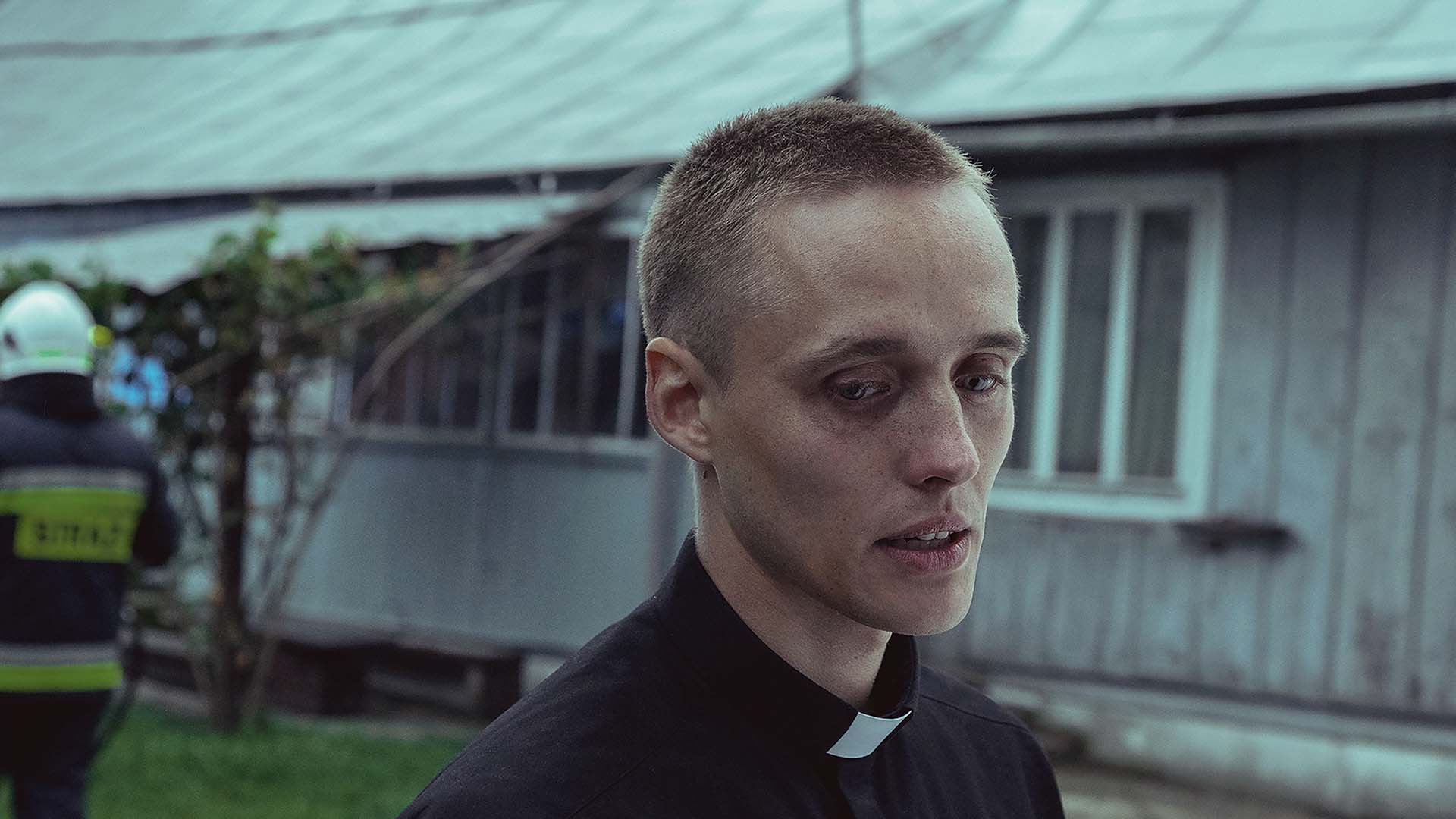Corpus Christi
Nominated for an Oscar in 2020, this Polish drama serves up a blistering examination of benevolence, redemption and acceptance.
Overview
No one wants to live in a world where Parasite, the best movie of 2019, doesn't exist. But if it didn't for some reason, it's highly likely that Corpus Christi would've been this year's Best International Feature Film Oscar-winner, rather than just a nominee. This Polish drama also focuses on people pretending to be something they're not. As directed by Warsaw 44 and The Hater's Jan Komasa, and written by the latter's screenwriter Mateusz Pacewicz, it casts a wry eye over much about life in their homeland today, too. And it isn't afraid to call out hypocrisy, societal divisions and greed, either — literally in the latter case, via its protagonist's speech at the local sawmill. There are few other similarities between Corpus Christi and the movie it lost to, but perhaps the only one that really matters is how potently, blisteringly and rousingly it unfurls its on-screen gifts. Well that, and how striking every second of the film looks, pairing its ashen, almost-hazy aesthetics with its complicated account of an ex-juvenile delinquent who poses as a small-town priest.
The imposter's name is Daniel and, as played with soulful intensity by star-in-the-making Bartosz Bielenia, he's a complex figure. First seen serving the final days of his reform school sentence, he has made a fan out of the facility's head priest, Father Tomasz (Lukasz Simlat). In fact, if Daniel's criminal record didn't preclude it, he'd desperately love to follow in the elder man's footsteps and join the seminary. While the correctional centre's hierarchy means that he has to take on look-out duties when his fellow inmates brutally rough up one of their own — lest he be on the receiving end instead — the look in the 20-year-old's eyes whenever he's reminded that his past choices have stripped away his preferred future is haunting. There's much about Bielenia's exceptional performance that sears itself into memory, but that firm, mournful gaze that adorns his face again and again is unshakeably powerful and poignant.
When Daniel is released to work at the aforementioned sawmill in rural Poland, it's better than incarceration. Of course, it's hardly what he has dreamed about. Call it fate, call it divine intervention, or call it either good or dumb luck, but he's soon given the chance to pursue his calling. Through a series of events that never feels convenient or strained, Daniel claims that he's a priest — and that contention largely goes unquestioned. In a close-knit community of devout but struggling souls, with the area rocked by a recent tragedy that still lingers, locals eagerly welcome him as their new spiritual advisor. Daniel's devotion to the task helps to mask his youthful years. With those around his age, he's particularly at ease. He also genuinely has faith and believes in the job, so the jump from jailhouse scraps and drug-addled post-release parties to assisting his surprise congregation is both easy and natural.
Corpus Christi is loosely inspired by real-life details, but even though this is a movie about an unconventional priest, it isn't the type of religious true tale that might instantly spring to mind. It couldn't be further from the dutifully pious standard, which remains the case even as it gifts its young protagonist with an unexpected second chance — an unlikely opportunity to follow his heart and make a difference to an insular yet divided town, too — and demonstrates that he's not the only one within the movie's frames with a troubled past to overcome. Whether he's attempting to convince the locals that an old grief-fuelled grudge reflects badly upon their character or getting closer to parishioner Marta (Eliza Rycembel) to an ungodly degree, Daniel is a wiry and magnetic bag of contradictions. Much the same can be said of his potential absolution, too. His motives are sincere, but his shot at vindication springs through subterfuge — well-meaning subterfuge that's purely a result of grasping an opportunity, rather than any misdeeds or maliciousness, but subterfuge all the same.
Crafting a film that starts with grey hues, grim visuals and a mood to match, and never buffers out or prays away the grit in its aesthetics, Komasa uses Daniel's situation to veer down an important path. Benevolence and redemption are key tenets of Catholicism, and of many faiths, but there's a difference between speaking of them and putting them into action — which Corpus Christi explores in every reaction that comes its central figure's way. The film doesn't deify its protagonist, nor shy away from his mistakes and woes, but it clearly sees and accepts his desire to aid others. And, in the process, it asks what might be considered a sacrilegious question to some: if people can find the solace, warmth and comfort they yearn for in biblical characters who teach compassion and charity, why can't they in a tattooed, scarred, street-smart ex-criminal standing in front of them, getting to know them, willingly dedicating his time to helping them, and driven by the same kind intentions and aspirations?
If that train of thought sounds thorny, tricky and even anxiety-inducing, that's Corpus Christi. When he's lost in prayer, Bielenia's face may look angelic; however, nothing else about this movie is ever so blissful or simple. As a film about a rehabilitated crim-turned-masquerading cleric, tension and foreboding unsurprisingly seethes through every second. First, Daniel wonders how he'll ever be seen as anything other than "scum", as he's called. Next, he worries about maintaining his deception and keeping the position he treasures. As it bubbles and broods, Corpus Christi doesn't ever offer simple answers — to audiences or to its lead character. That's to be expected; this is a feature that spends its entire time rallying against easy solutions, after all.





